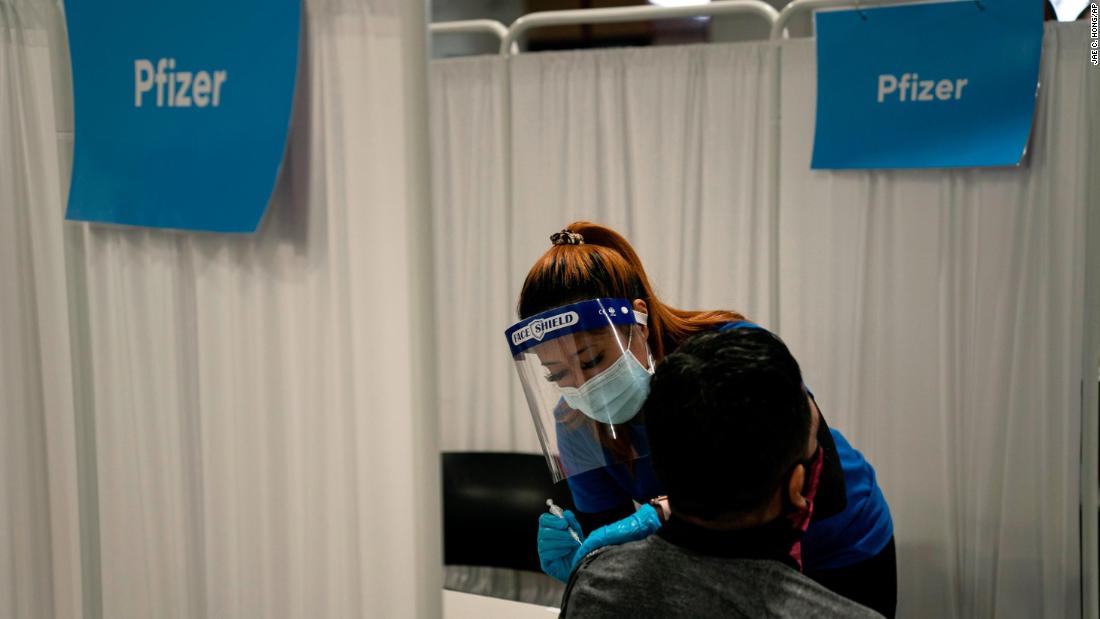(CNN) — Despite hopes that full approval of Pfizer’s covid-19 vaccine would convince large numbers of Americans who are hesitant to get vaccinated, a federal government analysis provided to CNN suggests that approval was not a silver bullet.
After the U.S. Food and Drug Administration (FDA) gave full approval to Pfizer’s vaccine in August, application rates for that vaccine increased, but the increase was modest and relatively short-lived.
“There were no sudden lines around the block,” said Becca Siegel, senior advisor for the public education campaign for the US Department of Health and Human Services (HHS).
The data backs up what a recent survey found: While full approval may be important to some unvaccinated Americans, it’s likely not the only reason they’ll get the vaccine.
“For truly indecisive people, this is a complex decision. It is not one thing,” Siegel said.
According to the survey, another factor is more persuasive than full approval is fear: fear of dying from COVID-19 or missing out on activities such as trips, concerts, or sporting events that require vaccination.
This leaves federal officials in the middle of a long, slow job to get unvaccinated Americans finally vaccinated and help end the pandemic. Currently, 75.8% of eligible Americans have received at least one dose of the COVID-19 vaccine, according to the US Centers for Disease Control and Prevention (CDC), a number that has increased very slowly in recent months.
The summer polls offered high hopes
On August 23, the day the FDA approved the Pfizer / BioNTech covid-19 vaccine, President Joe Biden pleaded with unvaccinated Americans.
“If you are one of the millions of Americans who said they will not get the vaccine until it has full and final approval from the FDA, now it has happened. The moment you have been waiting for is here. It is time for you to go to Get vaccinated, so you go today, today, “Biden said.
Biden had good reason for optimism.
According to a survey conducted in June by the Kaiser Family Foundation, About half of the people who were taking a “wait and see” approach to vaccination said they would be more likely to get vaccinated if the FDA fully approved one of the COVID-19 vaccines.
“Many unvaccinated people are concerned that vaccines are experimental and concerns about vaccine safety are one of the main reasons some groups are hesitant to get vaccinated,” wrote Drew Altman, president and CEO of Kaiser, in August. . “The lack of FDA approval has allowed the idea that vaccines are not safe or ineffective to spread.”
A modest short-term increase after full approval of the Pfizer vaccine
It turned out that full FDA approval helped change some people’s minds, but the effect was not dramatic.
From Aug. 23 to Sept. 3, Pfizer’s seven-day average of dosing increased by 16%, from 575,000 per day to 668,000 per day, according to the HHS analysis. By comparison, uptake of Moderna’s vaccine, which is licensed for emergency use but not fully approved, increased by 5% during that time.
Of course, an increase in vaccination rates can be due to many factors. But the increase in Pfizer’s vaccine after approval is especially notable because in the weeks leading up to full approval, Moderna was experiencing larger increases than Pfizer, according to an analysis conducted for CNN by the Laboratory of Computational Epidemiology at Boston Children’s Hospital. , which drives the website Vaccines.gov.
After September 4, the seven-day averages for both vaccines began to decline.
Running ‘the last mile’
A September poll could help explain why the full license had no more effect.
A survey of the Kaiser Family Foundation last month showed that FDA approval played a relatively minor role in vaccine decision-making.
In that survey, only 15% of recently vaccinated people said that Pfizer’s full approval of the vaccine was one of the main reasons they received the vaccine, and only 2% said that was the main reason.
The Kaiser survey found that other factors were more likely to be one of the main reasons for getting vaccinated: the increase in cases due to the delta variant; concern for hospitals that fill up with patients with covid-19; know someone who became seriously ill or died from covid-19; wanting to participate in certain activities, such as traveling; be required to receive a vaccination from an employer; and social pressure from family and friends.
Siegel, an expert in analysis and public opinion at HHS, said she believes full approval could still play a long-term role, in combination with other factors, in convincing people to get the vaccine.
“We won’t see the impact of approval on day one, hour one, but we could see it for a long period of time,” he said.
About 1 in 4 eligible Americans has not received a single dose of the COVID-19 vaccine, and Siegel noted that there is no simple way to convince them.
“This is a slow and steady march,” he added. “It’s not getting easier and it won’t be easier.”
The fact that nothing so far – not full approval, not overflowing hospitals, not 700,000 dead Americans – has convinced tens of millions of Americans to get vaccinated is reason enough for the mandates, some experts say.
“I think we need to recognize that the mandates are what we have come to really drive increases in vaccination,” said John Brownstein, director of the Computational Epidemiology Laboratory at Boston Children’s Hospital and a professor at Harvard Medical School. “Vaccination mandates are very important to cover the last mile for those on the fence.”
CNN’s Deidre McPhillips and Virginia Langmaid contributed to this report.
–


